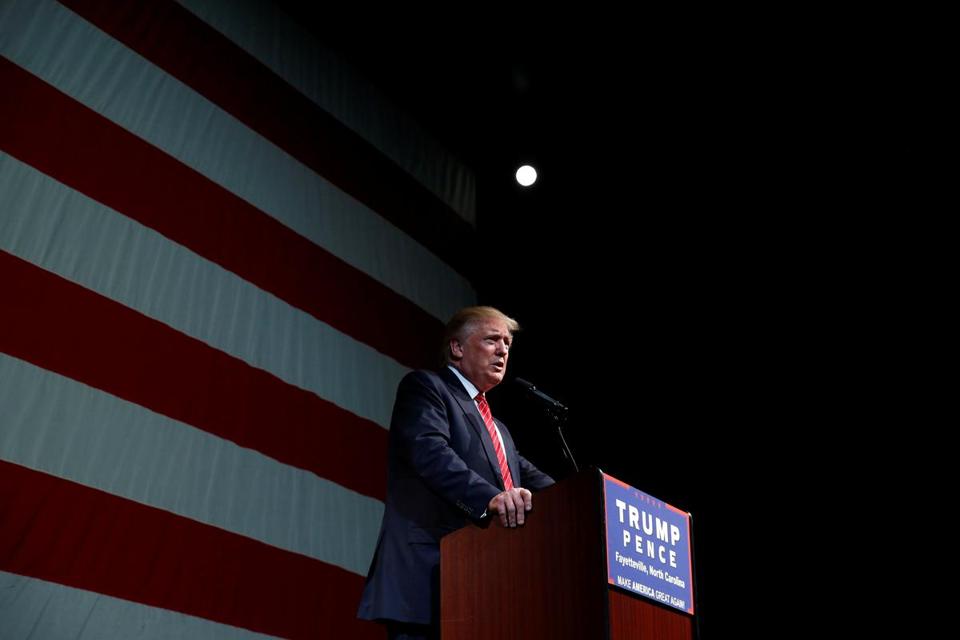
WASHINGTON — Hillary Clinton’s campaign just threw down the gauntlet, challenging Donald Trump to accept the three presidential debates that have been scheduled.
In a statement Monday night, Clinton’s campaign chairman, John Podesta, announced that Clinton would participate in the debates and said the ‘‘only issue now is whether Donald Trump is going to show up.’’
It’s a valid question. It’s also fascinating timing from the Clinton campaign, which has just grabbed as much as a double-digit lead in the national polls. Candidates who are in the lead will general try to minimize the number of debates — as Bernie Sanders’s campaign accused Clinton and the Democratic National Committee of doing during the primary — because they provide an opportunity for slip-ups. But a confident Clinton seems to be using this timing to get a desperate Trump to commit (or just to spotlight the fact that he hasn’t.)
Still, it’s apparent that Trump might very well skip one or more debates anyway – becoming the first candidate to do so since 1972. For a few reasons:
Contents
1) He’s not very good at them
Yes, Trump won the Republican primary, which featured plenty of debates. But it was largely in spite of his lackluster debate performances. We even looked at his performances from the first few debates and found he generally lost ground after them, while his opponents gained.
Trump’s primary strategy was to be a ubiquitous presence in the media and run a largely policy-free campaign, and being on the debate stage with other Republicans worked against him on both counts. As our own Chris Cillizza wrote in January:
Here’s how the arc of Debate Donald usually goes. Positioned in the center of the stage – it’s where he’s been in almost every debate – Trump is active, if not overwhelmingly aggressive, in the first 30-45 minutes. When answering a question during that time, Trump tends to avoid any policy details and has, on occasion, shown a remarkable lack of knowledge on issues. (He had no clue what the ‘‘nuclear triad’’ was in the fifth debate, for example.)
When Trump was successful at the debates, it was largely when he was ragging on the media and throwing red meat to the conservative base. He also benefited from being alongside many – as many as 10 – other candidates who allowed him to pick his spots and disappear when it suited him. The fewest candidates on a GOP debate stage was four, on March 10. Trump pulled out of a March 21 debate when it would have been just him, Ted Cruz and John Kasich.
Being on a stage one-on-one with Clinton is another beast entirely. Trump’s poor grasp of policy and subpar debating record don’t portend good things for him in general election debates that will be much more policy-heavy and require him to talk much more.
2) He can be baited, and Clinton is good at it
One of the most-quoted lines of Hillary Clinton’s Democratic National Convention speech was this:
‘‘A man you can bait with a tweet is not a man we can trust with nuclear weapons.’’ -Hillary
And sure enough, that same night, the Clinton campaign baited Trump, and he swallowed it hook, line and sinker.
Shortly before Clinton’s address at the convention, Khizr Khan spoke about his son, a Muslim US soldier who was killed in Iraq. Khan decried Trump’s policies on Muslims — particularly his oscillating ban on Muslim immigrants.
Trump, as he tends to, hit back at Khan and his wife. The result was a disaster for him. A Washington Post-ABC News poll this week fund just 13 percent of registered voters approved of Trump’s handling of the situation, while a whopping 74 percent disapproved – more than 50 percent of them strongly.
Trump’s comments about women also come into play here. There was one woman on the GOP debate stage: Carly Fiorina. At one point he even insulted her looks, saying, ‘‘Look at that face. Would anyone vote for that? Can you imagine that, the face of our next president!?’’ Her debate-stage response:
‘‘I think women all over this country heard very clearly what Mr Trump said,’’ Fiorina replied to raucous cheers and applause. For his part, Trump looked genuinely taken aback.
And Clinton is certainly capable of baiting her opponents. She did so during an exchange at one of the Democratic debates, when at one point Sanders silences her and says, ‘‘Excuse me, I’m talking.’’
Trump survived this kind of thing in the GOP debates when concerns about sexism were less damaging for him. But polls show that as many as 70 to 75 percent of women now don’t like him — 70 percent in this week’s Post-ABC poll.
Clinton is a very studied and capable debater who will spend plenty of time figuring out ways to bait Trump in these contests. And it’s not hard to see him getting drawn into all kinds of exchanges that reinforce his many established liabilities.
3) He’s already hinted strongly that he won’t
Trump has already laid the groundwork for declining the debates. He recently tweeted that the dates are all wrong and suggested that Clinton’s campaign somehow rigged the dates — just like Sanders’s campaign argued in the Democratic primary — to make sure nobody watches.
As our own Philip Bump wrote, this doesn’t make much sense — especially given that the debates were scheduled long before the NFL schedule was released. But either way, it’s clear what Trump is doing here. And actually the bogusness of his complaint makes it even clearer.
There’s also the fact that Trump has repeatedly threatened to and in a couple of cases actually followed through on skipping primary debates. Besides that March 21 debate — he cited a conflicting event — he skipped a Jan. 28 debate when he was feuding with Fox News and Megyn Kelly.
Oh, and he also threatened to boycott debates on Oct. 28 and Dec. 15. In the latter case, he said he wanted CNN to donate $5 million to a veterans charity to secure his participation. He still showed up in both cases.
In other words, Trump either skipped or threatened to skip 31 percent of the scheduled GOP debates — four out of 13. He clearly didn’t like doing it. That hasn’t changed.



